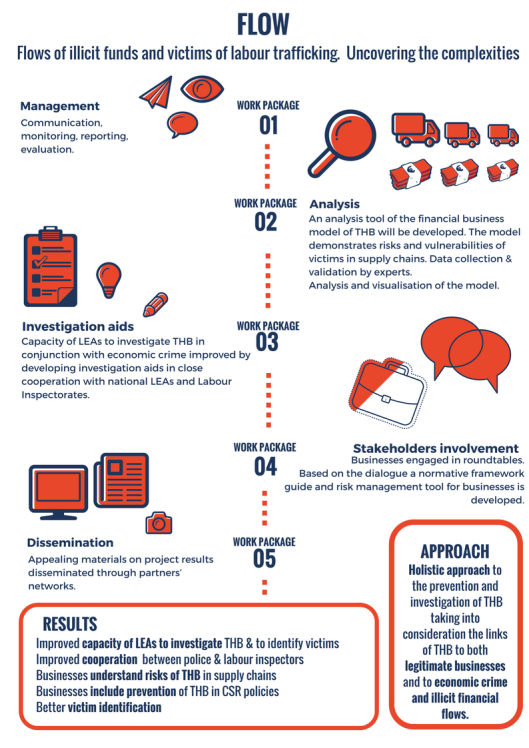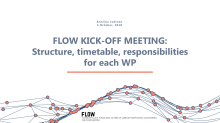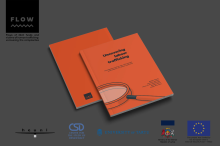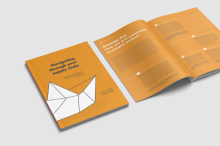FLOW. Flows of illicit funds and victims of human trafficking: uncovering the complexities (2018 - 2020)

This project was funded by the European Union’s Internal Security Fund — Police
PROJECT INFORMATION
The FLOW project promotes a holistic approach to the prevention and investigation of trafficking in human beings (THB) in conjunction with economic crime and engages businesses in the prevention of THB.
THB is an end result of complex interconnections between unsustainable business practices, organized crime, corruption and illicit flows. When tackling this nexus understanding these connections, and cooperation between business, law enforcement and labour inspectors is crucial. And moreover, the needs and rights of the victim of THB should be at the core of the actions taken.
HEUNI’s research has shown that:
Firstly, labour exploitation and trafficking in human beings (THB) are not adequately recognized and addressed by law enforcement authorities. THB crimes are usually addressed either within the framework of economic crime control, or as a form of violent crime, but rarely as both at the same time. This means that the combination of economic crimes against the state, and the infringements of the rights of individual victims, may not fully be addressed. Secondly, this project utilizes the concept that labour exploitation is a form of corporate crime motivated by economic profit. Companies engaging in THB gain an unfair economic advantage and distort competition and the functioning of the free market (Ollus 2016). The project therefore aims to engage both law enforcement and the private sector in order to address THB holistically, keeping in mind that victims of trafficking may also be exploited in multiple ways, e.g. both in forced labour as well as for sexual exploitation.
THB is a complex crime. Often a multitude of other crimes are associated with THB. However, often the investigation of THB excludes the links to other, related crimes. Similarly, a focus on economic crime investigation often excludes the investigation of THB. This may be due to a lack of resources, but it also related to a lack of knowledge and understanding of the complexities around THB. The project addresses this gap by creating investigation aid for law enforcement, with the aim to promote a more holistic approach to the investigation of THB, in particular in conjunction with economic crime and illicit financial flows. Such investigation calls for specific understanding and skills as well as cooperation between specialised police units (THB investigation, economic crime investigation etc). It also calls for cooperation with other authorities, most notably labour inspectors who come into contact with businesses. Dialogue and cooperation between these authorities is enhanced as part of the project activities. The investigation aids will be created with the victim-centered approach at the core; underlining the needs and rights of the victims in the identification and investigation phase, as well as the importance to make sure that the victim is referred to assistance according to the victim’s individual needs.
Secondly, this project acknowledges that THB is driven by the possibility to make profit on many levels, and businesses profiting from THB are not restricted to criminal organisations. In fact, it is often a chain of legitimate businesses that engage in THB, both knowingly and unknowingly. Based on the project partners’ previous experience from engagement with the private sector, it is known that businesses do have an increased desire to address the risks of THB in their operations, and to minimize these risk through CSR guidelines and tools. Further, during recent years there has been a significant intensification of global action against forced labour and THB in global supply chains, – including increased focus on the responsibility and role of businesses.
The tools developed in the project will be tailored for the 4 project countries, Finland, Bulgaria, Estonia and Latvia. The investigation aids developed for the law enforcement will be done in cooperation with the Central Finland and Ostrobothnia Police Departments, Labour Inspectorate of Southern Finland, State Police of Latvia, State Labour Inspectorate of Latvia, General Directorate Countering Organised Crime at the Ministry of Interior of Bulgaria, General Labour Inspectorate Executive Agency of Bulgaria, Ministry of Justice Estonia, Estonian Unemployment Insurance Fund (EURES), State Police of Estonia, Estonian Prosecutor’s Office. The business risk management tools will be done together with national business representatives in order to validate the guidelines and enhance their knowledge on risks related to labour exploitation, incl. the Corporate Social Responsibility Platform of Latvia (CSR Latvia) and Employers’ Confederation of Latvia (LDDK), Estonian Association of Construction Entrepreneurs, Confederation of Finnish Construction Industries RT (CFCI), ArcTech Helsinki Shipyard and Building Information Group. The tools will be tailored within the course of this project to the partner countries’ needs, but can also be used in other MS with minor adjustments.
The project partners include European Institute for Crime Prevention and Control, affiliated with the United Nations (HEUNI) from Finland, The Center for the Study of Democracy (CSD), from Bulgaria, the University of Tartu from Estonia and Ministry of Interior of Latvia.
The partners’ expertise complements each other in the areas of organized crime, illicit flows and THB with a focus on the victim-centred approach.

Contact information:
Anniina Jokinen, project manager in Finland,head of the project management team, anniina.jokinen@om.fi
Aleksandra Anikina, communication assistant at HEUNI, aleksandra.anikina@om.fi
Anna Markina, project manager in Estonia, head of the dissemination team, anna.markina@ut.ee
Lāsma Stabina, project manager in Latvia, National Anti-Trafficking Coordinator, lasma.stabina@iem.gov.lv
Atanas Rusev, project manager in Bulgaria, head of the analysis on the business model of THB, atanas.rusev@csd.bg
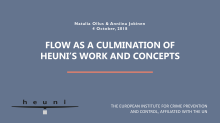 Presentation "FLOW project in the context of HEUNI's previous research" for the kick-off meeting in Helsinki. 4.10.18
Presentation "FLOW project in the context of HEUNI's previous research" for the kick-off meeting in Helsinki. 4.10.18